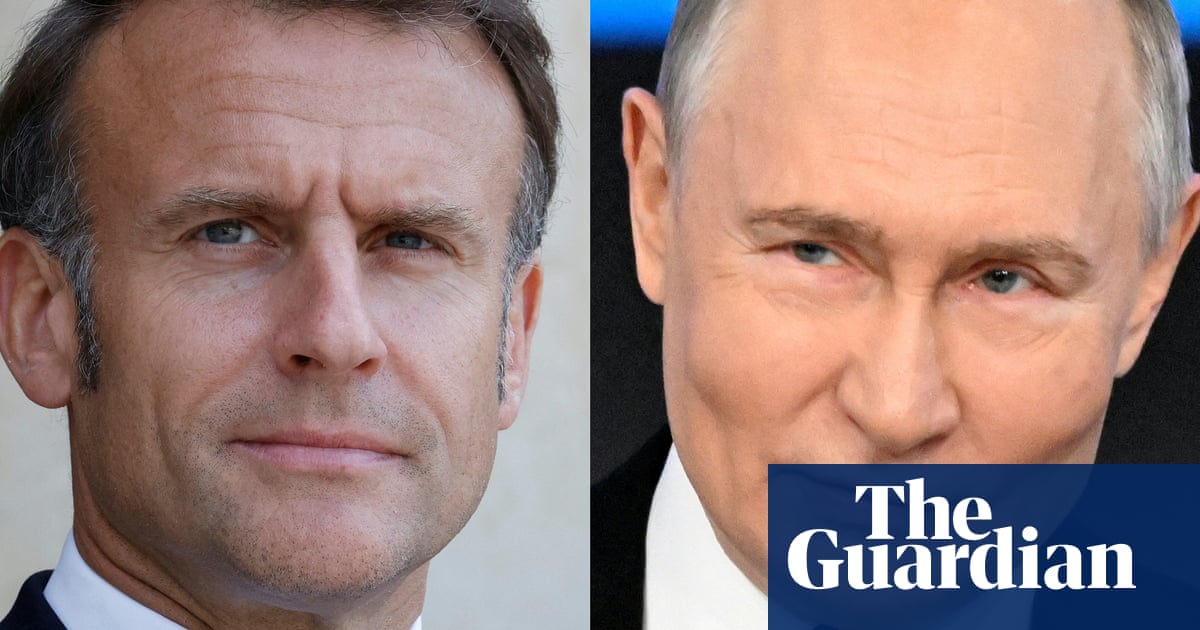The French president,Emmanuel Macron, spoke to his Russian counterpart, Vladimir Putin, for the first time in three years on Tuesday in an attempt to de-escalate the Iran crisis, as Tehran confirmed it was ending all cooperation with the UN nuclear inspectorate, including banning its inspectors from visiting any of its nuclear sites.
Macron had refused to speak to Putin since the Russian leader ordered the invasion of Ukraine in 2022, but Paris has become frustrated that the lack of communication with Moscow is not solving multiple crises, and leaving the diplomatic events exposed to the relationship between Putin and Donald Trump.
In statements after the two-hour phone call, a French spokesperson said Macron was left more positive about the possibility of Russia pressingIranto restore cooperation with the nuclear inspectorate, the International Atomic Energy Agency (IAEA).
The French indicated a willingness to discuss the Iranian red line that it must have a right to enrich uranium domestically.
One reason given by Iran for ending cooperation with the IAEA is the failure of the agency’s leadership to condemn the Israeli attacks on its nuclear sites as a flagrant violation of the nuclear non-proliferation treaty.
The German foreign ministry said Iran’s decision to suspend cooperation with the IAEA sent a “disastrous signal”. “For a diplomatic solution it is essential for Iran to work with the IAEA,” German officials said. Berlin said it had been informed of the Macron call to Putin in advance.
In an interview with Le Monde, the French foreign minister, Jean-Noël Barrot, urged Iran to cooperate with the IAEA. But he also said Israel’s strikes “are not in accordance with international law. They have certainly set back Iran’s nuclear programme. But only a negotiated framework will allow us to permanently avert the danger.”
He added: “We support the resumption of US negotiations with Iran, but it is essential that our security interests be taken into account. European territory is potentially within range of missiles designed in Iran.”
Asked about Iran’s right to domestic enrichment he said: “What is essential is that Iran cannot acquire a nuclear weapon under any circumstances.”
French officials did not rule out Iranian domestic enrichment, as allowed in the 2015 nuclear deal.
The Kremlin readout of the Macron-Putin call said: “It was noted that respecting Tehran’s legitimate right to develop peaceful nuclear technology and continue to fulfil its obligations under the treaty on the non-proliferation of nuclear weapons, which includes cooperating with the IAEA, was crucial.”
It went on: “The two leaders spoke in favour of settling the crisis around Iran’s nuclear programme and any other differences arising in the Middle East exclusively via political and diplomatic means. They agreed to maintain contact in order to coordinate their stances if necessary.”
Iran has been steadily moving towards freezing out the IAEA, making it harder for any independent assessment to be made of the scale of the damage inflicted on Iran’s nuclear sites by the US and Israel strikes. On 25 June, the day after the ceasefire that ended 12 days of war, the Iranian parliament overwhelmingly voted for a bill suspending cooperation between Iran and UN agency.
The law was then approved by the guardian council, the body responsible for reviewing legislation in Iran, before being ratified by the Iranian president, Masoud Pezeshkian.
It is thought a small number of IAEA inspectors are still in the country.
Asked about efforts to revive the postponed UN special conference on the two-state solution, Barrot saidFrancewas discussing a possible date as soon as possible with the conference co-chair Saudi Arabia. He said: “There is an emergency. An emergency in Gaza, for the hostages and the Palestinian population. It is also urgent to restore a political horizon that alone will allow us to emerge from the permanent state of war and offer both peoples a response to their legitimate aspirations.
“The solution is more than ever undermined by colonisation in the West Bank, by the destruction in Gaza, and by a form of resignation on the part of the international community. The danger would be that this political solution comes too late.”
Analysis by the Israeli newspaper Haaretz claimed Iran launched more than 500 ballistic missiles at Israel, most of which landed in open areas, throughout the recent 12-day conflict. Israel and the US intercepted the remainder with about 200 missile interceptors at an estimated cost of 5bn shekels (£1.1bn), according to an analysis of IDF data and open-source information.
Data compiled by Haaretz from IDF reports over the course of the war shows Iran carried out 42 missile barrages, firing roughly 530 ballistic missiles at Israel.
The IDF reported that during the 12-day conflict 36 Iranian missiles struck built-up areas, while air defence systems achieved an interception rate of 86%.
